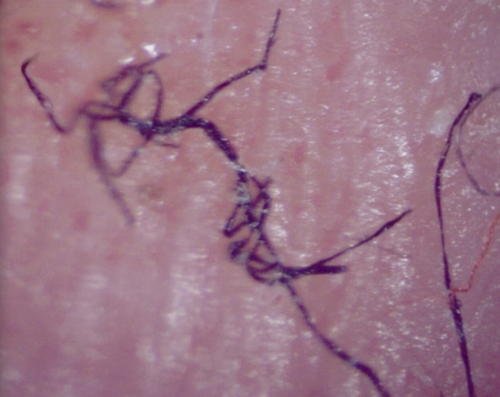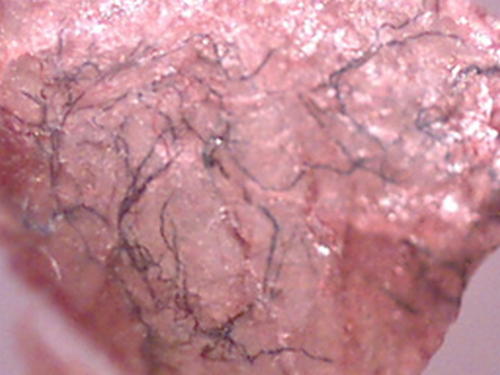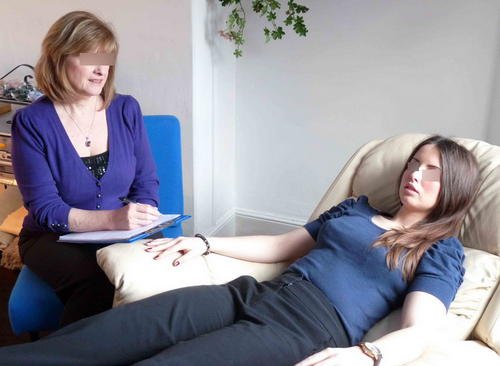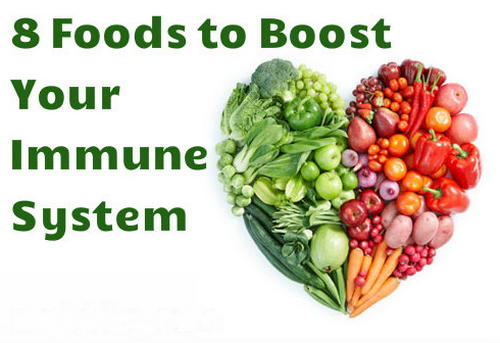Morgellons Disease
Last reviewed by Dr. Raj MD on January 12th, 2022.
What is Morgellons Disease ?
Morgellons disease is quite a complicated disorder. It is somewhere between skin disorder and delusional parasitosis. People who have Morgellons disease have sores and feel like there is something crawling underneath the skin, specifically a fiber-like filament that emerge from the sores.
Although some medical experts believed that it is indeed a physical illness, others strongly believed that it is a type of psychosis in the form of delusional parasitosis. (1, 2, 3)
Morgellons Disease Pictures

Image 1: A string substance visible underneath the skin.
Picture Source: img.medscape.com
Photo 2: Skin lesions/sores of patient with Morgellons disease.
Picture Source: images.indiegogo.com
What is delusional parasitosis?
It is a state of mind in which a person mistakenly believed that he/she is infested with a parasite, bugs, or insects. In reality, there is no such infestation. It is just all in the mind. (3)
Clinical manifestations : Signs and Symptoms

Image 3: A severe skin condition of a patient suspecting Morgellons disease.
Picture Source: www.thecehf.org
What does Morgellons disease look like? What are the signs and symptoms? The patient primarily complains of the following:
- Itchy skin rashes/sores
- A sensation that something is living and crawling underneath the skin such as a bug or a parasite.
- A feeling like a string object such as fiber or thread is under the skin.
- Discomfort secondary to intense itching (4)
- Inability to focus and remain still because of the crawling sensation underneath the skin.
- Fatigue
- Short-term memory loss
- Sleep deprivation
- Nervous-related concerns (3)
Diagnosing Morgellons disease
Diagnosing Morgellons disease can be quite difficult considering the nature of the condition. Health care practitioners oftentimes misinterpret the patient’s symptoms as parasitic in nature but further research revealed that there are no parasites involved.
In fact, no fungal components were seen in the patient’s lesions/sores. What studies revealed is a spirochetal bacterium called Borrelia. Other types of bacteria found in lesions of patients with Morgellons are Treponema denticola and H. pylori.
At the moment, there is no specific diagnostic procedure to confirm the presence of Morgellons disease. The presence of bacteria strongly suggests that the patient needs to be tested for Lyme disease. But even so, there is no specific test that could accurately diagnose Lyme disease.
Up to this day, Morgellons is not yet recognized as a medical disorder. Each individual case of Morgellons may have a distinct contributing factor. (4, 5, 6, 7)
Photo 4: A severe skin lesion on the patient’s face.
Picture Source: wikisickness.com
Is Morgellons contagious?
Morgellons disease is not contagious. It cannot be easily transmitted via direct contact. Some people feel like it is highly contagious given the appearance of sores and the fiber-like formation.
What are the fibers in Morgellons? The fibers look like sand crystals or black specks are actually produced by the cells in the body. It is the cells’ way of coping with the underlying infection. They do not contain active bacteria that can transmit diseases. (7)
How to cope with Morgellons disease?
Having a Morgellons disease can be extremely distressing and fearful considering the questionable nature of the disease. Even so, every patient deserves treatment and compassionate care.
There is no definite cure for Morgellons and each case is treated as unique. Hence, the treatment approach varies from one patient to another. (8, 9)
#1: Antibacterial/antimicrobial drugs
The goal of the treatment is to get rid of the bacteria-causing disease. Hence, the doctor prescribes antibacterial/antimicrobial drug. It would take months to years before you can see a significant improvement in the overall condition of the patient.
Given the physical and psychological concerns of the patient, a healthcare team is needed to thoroughly assess the condition of the patient and provide appropriate care and management. (4, 5, 6)
#2: Hypnotherapy

Image 5: Hypnotherapy as one of the clinical management for Morgellons disease.
Picture Source: www.getholistichealth.com
Studies show that hypnotherapy can actually help in the physiologic and psychological management of people suffering from Morgellons disease. For this reason, it is important to see a psychologist to determine the best psychological approach to treating Morgellons and other related symptoms. (7, 8)
#3: Boost the immune system

Photo 6: A healthy immune system keeps you away from various forms of infectious diseases.
Picture Source: nozinblog.com
A strong immune system helps fight off infection. It also improves the healing ability of the body.
According to Morgellons Foundation in the United Kingdom, in order to boost the immune system, you need to eat the right foods which consist of the following:
- Increase your intake of complex carbohydrates such as brown rice, oats, whole-grain bread, and whole wheat pasta.
- Keep your intake of processed sugar to a minimum. Examples of processed sugars are cakes, cookies, and candies.
- Increase your intake of fruits and vegetables, especially the ones high in vitamins and minerals. The most recommended fruits and vegetables include green leafy vegetables like spinach, tomatoes, carrots, cucumbers, berries, apples, and oranges.
- Increase your intake of protein such as fish, poultry products, and red meat. Get rid of the fat content. If you are vegetarian, a good source of protein is beans and chickpeas.
- Use herbs and spices with bacterial and antifungal properties. Examples are garlic, black pepper, and turmeric. (8, 9, 10)
#4: Wound self-care technique
Use mild self-care methods to cleanse the skin. Make it a habit to take a bath every single day. Apply antibacterial cleansing agent to get rid of the infection and prevent further inflammation.
You can apply essential oil, especially the ones tested and proven effective in treating various types of skin ailments. When unsure as to whether or not a treatment is safe, the best thing to do is to consult your doctor. Do not use extreme measures without consulting your doctor. (2, 5, 7)
Conclusion
Morgellons disease is a condition characterized by painful skin lesions and fibrous growth from the skin. Those who have it complain of itching and burning sensation. The patient describes the sensation as something moving or crawling underneath the skin.
The disturbing nature of the disease makes the patient feel anxious, disturbed, and depressed. Some health experts believed that it is just a case of delusional parasitosis. Up until today, the disease remains mysterious are is not yet recognized medically. (1, 5, 10)
References:
- https://www.mayoclinic.org/morgellons-disease/art-20044996
- https://www.medicinenet.com/morgellons_disease/article.htm
- https://en.wikipedia.org/wiki/Morgellons
- https://www.webmd.com/skin-problems-and-treatments/morgellons-disease-what-is-it#1
- http://www.morgellons.org/
- https://www.ncbi.nlm.nih.gov/pmc/articles/PMC5038112/
- http://time.com/3768710/what-is-morgellons-joni-mitchell/
- https://www.scientificamerican.com/article/morgellons-disease-parasites-skin-psychiatric/
- https://www.webmd.boots.com/skin-problems-and-treatments/guide/morgellons-disease
- https://www.theatlantic.com/health/archive/2015/01/diagnosis-or-delusion/384206/